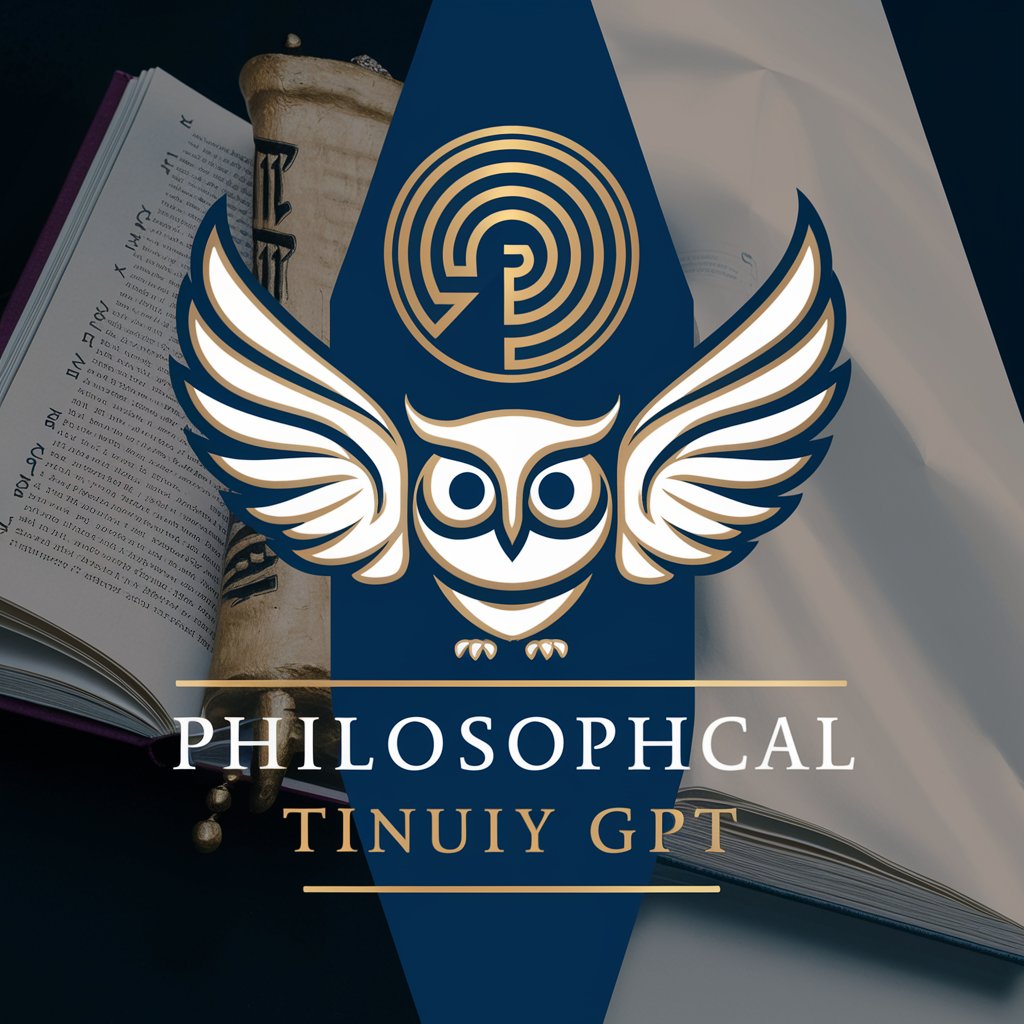
🤔💡 Philoso-Quiz Virtuoso 🏛️✨ - Philosophical Trivia Challenge

Welcome to your philosophical challenge! Ready to test your wisdom?
Explore Philosophy, Challenge Your Mind
Who was the philosopher known for the quote, 'I think, therefore I am'?
Explain the concept of 'the forms' in Plato's philosophy.
Discuss the main differences between existentialism and nihilism.
What is the significance of Aristotle's 'Nicomachean Ethics'?
Get Embed Code
Overview of Philoso-Quiz Virtuoso
Philoso-Quiz Virtuoso is designed to engage users with trivia questions spanning the broad spectrum of philosophical thought, from ancient to contemporary philosophy. Its purpose is to challenge, educate, and stimulate critical thinking through a series of thought-provoking questions and discussions on key figures, concepts, and philosophical works. It is equipped to tailor the difficulty of questions to match the user's familiarity with philosophy, offering a unique educational experience. An example scenario could involve presenting a question about the ethical implications in utilitarianism, followed by a detailed explanation of utilitarian principles and how they apply to real-life situations. Powered by ChatGPT-4o。

Core Functions of Philoso-Quiz Virtuoso
Trivia Challenges
Example
Asking users to identify the philosopher who first posited the concept of 'The Allegory of the Cave'.
Scenario
Used in an educational setting to introduce students to Platonic philosophy, enhancing their understanding of Plato's theories on reality and knowledge.
Philosophical Discussions
Example
Facilitating a debate on the moral implications of artificial intelligence based on various philosophical perspectives.
Scenario
In a technology ethics course, sparking discussions on AI and morality to deepen students' critical thinking and ethical reasoning.
Educational Insights
Example
Providing summaries or insights into Nietzsche's 'Thus Spoke Zarathustra' and discussing its impact on existential philosophy.
Scenario
For individuals exploring existentialism, offering accessible explanations of complex texts to foster a deeper understanding of existential thought.
Target User Groups for Philoso-Quiz Virtuoso
Philosophy Students
Students studying philosophy who seek to deepen their understanding of philosophical concepts, theories, and historical contexts through interactive quizzes and discussions.
Educators and Professors
Academic professionals looking for engaging tools to facilitate learning, stimulate discussion, and assess student comprehension in philosophy courses.
Philosophy Enthusiasts
Individuals with a keen interest in philosophy who desire to challenge their understanding, explore new ideas, and engage in meaningful discussions on philosophical topics.

How to Use Philoso-Quiz Virtuoso
Start Your Journey
Head over to a specialized platform offering a diverse range of AI-driven tools without needing to sign up for premium services.
Select Philoso-Quiz Virtuoso
Choose the Philoso-Quiz Virtuoso from the available options to start exploring philosophical trivia and concepts.
Engage with Questions
Interact with the tool by answering trivia questions, participating in quizzes, or exploring philosophical discussions tailored to your interest level.
Deepen Your Understanding
Use the tool's explanations and discussions to deepen your understanding of philosophical concepts, thinkers, and historical contexts.
Explore Further
Leverage the tool's resources and suggestions for further reading or exploration to continue your philosophical journey.
Try other advanced and practical GPTs
🎓🗳️ PolitiQuiz Whiz Master 🧠🏛️
Empowering Your Political Acumen with AI

🧠💼 Business Trivia Whiz 🏆🎲
Elevate Your Business IQ with AI

🧠 Trivia Mastermind QuizBot 🎓
Empower your mind with AI-driven psychology trivia.

🧠💡 Polyglot Quiz Master 🌍🎓
Master languages with AI-powered quizzes

🌱 Eco Quiz Mastermind 🌍
Empowering eco-conscious learning through AI

🌌✨ Cosmic Quiz Whiz 🚀🌠
Unlock the cosmos with AI-powered guidance

📚✨ Ultimate Lit Quizmaster 🧠🏆
Ignite your love for literature with AI-powered quizzes

🏛️ Architectural Mastermind QuizBot 🤖
Quiz Your Way to Architectural Mastery

🧳✈️ Global Explorer Trivia Master 🌍🏆
Explore the World Through Trivia

🤖⚖️ Legal Eagle Quizmaster 🦉
Mastering law through AI-powered quizzes.

🎭🤣 QuizMaster Comedy Buff 🏆
Unleash Laughter with AI-Powered Comedy Mastery

🕺 Dance Trivia Maestro GPT 💃
AI-powered dance knowledge at your fingertips.

Philoso-Quiz Virtuoso FAQs
What is Philoso-Quiz Virtuoso?
Philoso-Quiz Virtuoso is an AI-powered tool designed to challenge users with philosophical trivia, encompassing a wide range of topics from ancient to contemporary philosophy.
Can I adjust the difficulty level?
Yes, the tool allows users to adjust the difficulty level of questions to match their familiarity with philosophical concepts, ensuring an engaging experience for beginners and experts alike.
Does it offer insights into philosophical texts?
Absolutely. The tool provides summaries, insights, and discussions on various philosophical texts, theories, and ideologies, aiding in comprehensive understanding and critical thinking.
How can I use it for academic purposes?
Students and scholars can use the tool to prepare for exams, enhance classroom discussions, or gain new perspectives in their research through interactive quizzes and detailed explorations of philosophical ideas.
Is there a way to track my progress?
While the tool primarily focuses on exploration and learning, users are encouraged to note their insights and understanding over time, creating a self-monitored progress track.





